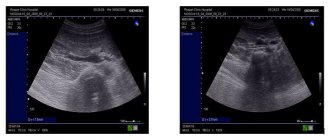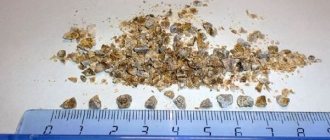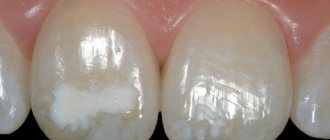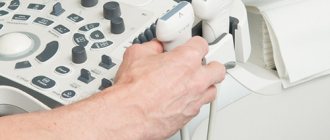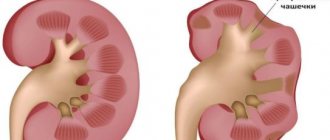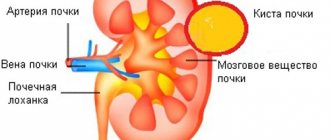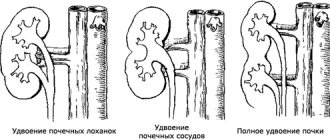The inflammatory process affects both the renal pelvis and all other tissues of one or both kidneys. In the strong half of humanity, the disease is often accompanied by prostate adenoma, kidney stones and other unpleasant problems. There are certain gender characteristics here, and therefore, pyelonephritis in men is still much less common than in the fair half of humanity. This is explained by the structure of the genitourinary system of gender antipodes. Unlike the female genitourinary system, the male genitourinary system has a significantly reduced risk of infection. But this same advantage is also a disadvantage, since it is almost impossible to diagnose pyelonephritis in men in the early stages due to the absence of any symptoms. When they already appear, the disease is often in an advanced state.
Urolithiasis symptoms
signs or symptoms of kidney stones as long as the stones are not moving. Some patients may feel heaviness, aching pain in the lower back, and sometimes blood in the urine . However, in most cases, the first sign of urolithiasis is an attack of renal colic , which appears when the stone moves towards the outlet of the kidney into the ureter and is associated with a sharp disruption of the outflow of urine from the kidney. The pain that arises in this case is so severe that the patient rushes about, unable to find a place for himself.
Many women who have experienced both childbirth and renal colic find it difficult to say which pain is stronger and often lean towards colic. Usually it is in this condition that a patient with urolithiasis comes to the urologist. Further, everything depends on the size and location of the stones (or concretions). In order to determine this, in many cases it is enough to perform an ultrasound (always with a full bladder). In some cases, an X-ray examination may be required - excretory urography or computed tomography (CT)
Diagnosis of the disease in men
At the first appointment, by interviewing and collecting information, the doctor assesses the likelihood of inflammation. To make a final diagnosis, the specialist prescribes a set of studies, such as :
- General urine analysis;
- General blood analysis;
- Culture for the causative agent of infection;
- Ultrasound of the kidneys;
- Kidney tomography;
After completing all the tests prescribed for the patient, the doctor will determine whether he has pyelonephritis, the stage of the disease and prescribe objective treatment.
Treatment methods for male pyelonephritis
This disease, in the absence of prostatitis and urolithiasis, often manifests itself without any particular complications and is subject to rapid and successful treatment. But the harm it causes to health cannot be underestimated! The prescribed antibacterial and anti-inflammatory therapy copes well with the infectious agent and the risk of consequences is eliminated.
If the pyelonephritis is complicated, and the patient, due to his inattention to his own health, allowed a late visit to the doctor, then the treatment process becomes longer.
In the acute form of the disease, mandatory hospitalization is indicated. If pyelonephritis is not treated in a timely manner, it will become chronic.
The acute phase of pyelonephritis is dangerous because there is a risk of complications. The possibility of blood infection in the patient increases due to the presence of apostetatous nephritis or carbuncle. In this case, formations in the form of ulcers appear in the cortex of the kidney, which can spread to the other kidney and cause extensive purulent lesions. In some cases, such a serious complication can be treated with antibacterial drugs, but often surgical intervention is required. Infectious nodes are removed, and the risk of relapse is reduced to zero, and kidney function is gradually improved. But it happens that in a rather advanced situation, removal of infectious nodes does not bring a positive result and the doctor may prescribe removal of the diseased kidney to the patient.
Recovery period
The treatment was successful and the recovery period began. Its importance cannot be underestimated. At this time, the patient needs to give up bad habits such as alcohol and smoking. Even for a healthy person, this carries its own destructive load, and for a patient who has recently recovered, smoking and alcohol are very dangerous and undesirable companions.
Hypothermia is also contraindicated if you have a previous illness. Pouring cold water for hardening purposes does not help, but rather provokes inflammation in the kidneys. Everything should be reasonable.
It is impossible to overestimate proper nutrition in this case. The patient is prescribed a special diet. Let this not scare anyone, since returning to your favorite gastronomic habits is required gradually. During the recovery stage, you need to wait a while without loading the kidneys with a high-protein diet, salty and smoked foods.
Questions about the article
Vitaly
March 14, 2021 at 04:29 pm
Hello, Anton Evgenievich! At work, my blood pressure rose sharply to 170/100, shortness of breath, cold sweat, anxiety, dizziness and a nagging, subtle pain in the left side in the area of the lower ribs and lower back. When I took tests, my blood was normal, my urine was normal, an ultrasound of the abdominal organs did not reveal anything other than an inflection of the bile duct and moderate diffuse changes in the pancreas. Ultrasound of the heart is normal. Only on an ultrasound of the kidneys they found a stone of 5 mm in the left upper calyx and sand up to 3 mm in the right. I rarely went to the toilet, but there was no discomfort, the urine was of a normal color, now I am worried about almost imperceptible pain on the left in the area of the lower ribs and lower back and also lack of air. Fluorography is normal without pathologies. The urologist said that my case should not provoke hypertension and a feeling of shortness of breath. Can stones cause these problems?
Anton Evgenievich Rotov
March 15, 2021 at 09:33
I agree with your urologist. Stones of this size and location are unlikely to cause a serious increase in pressure
Kidney stones in men: symptoms and their types
Sometimes the patient may not even be aware of the presence of kidney stones until the stones begin to move through the urinary tract and cause pain. Such painful sensations in the lumbar region can occur not only with kidney disease, but also with radiculitis, neuralgia and pneumonia, therefore, to make an accurate diagnosis, it is necessary to tell the doctor about other symptoms.
Kidney stones (urolithiasis): symptoms and signs of kidney stones in men:
- renal colic (one of the most important symptoms);
- acute paroxysmal pain in the lower back, hypochondrium, groin area, perineum and scrotum (occurs when a stone in the ureter obstructs the outflow of urine);
- sudden and sharp pain after intense physical activity (shaking, jumping, fast driving, etc.), as well as when drinking too much fluid or drinking alcohol. Painful sensations may vary in duration and intensity (from several hours to several days);
- nausea, vomiting, frequent urination, headaches and migraines, weakness, increased body temperature;
- sometimes bloating and intestinal paresis;
- blood in urine;
- cloudy urine;
- swelling of the limbs;
- increased blood pressure;
- spontaneous passage of stones.
Pain, which is a symptom and sign of kidney stones, can be constant or paroxysmal, acute or dull, and can also be localized either in certain areas of the genitourinary system, depending on the type and location of the stone, or spread to other parts of the body.
Types of kidney stones:
- calcium, calcium phosphate, calcium oxalate;
- struvite;
- urate;
- cystine;
- calcium carbonate;
Also, the division of stones by type is determined by the environmental conditions and pH of the urine in which the stones are formed (acidic or alkaline).
Kidney stones: causes of formation
Just as the signs of the disease are numerous, so are the factors that influence the occurrence and development of the disease. Knowing not only the signs and types of stones, but also the causes, the doctor will select and prescribe an appropriate course of treatment.
Kidney stones: what causes them and why?
There are external and internal factors that affect a man’s overall health and how quickly and in what form kidney stones will form. It is important to pinpoint the cause or multiple causes so that treatment is targeted.
External causes of kidney stones:
- climatic conditions and geography (lack of sun, vitamin D deficiency, dehydration due to heat);
- poor diet (too much spicy and sour food in the diet, which increases the acidity of urine);
- sedentary and monotonous lifestyle;
- harmful working conditions (harmful industries, constant heavy physical labor);
- drinking hard water with a high content of calcium salts.
The formation of kidney stones also depends on the internal causes of urolithiasis:
- hyperfunction of the parathyroid glands;
- chronic gastrointestinal diseases (ulcers, gastritis, other diseases of the stomach and duodenum);
- fractures and other bone injuries;
- violation of the protective function of the liver;
- lack of any enzymes in the body;
- kidney disease (stagnation of urine, impaired outflow, enlargement of the kidney, prostate adenoma, inflammation of the kidneys, prolapse of the kidney, impaired circulation in the organ due to injury).
Whatever the cause of urolithiasis, it must be treated. And the sooner the patient consults a doctor, the faster he can get rid of pain and illness. It must be remembered that prolonged refusal of treatment can lead to consequences that can seriously affect a man’s overall health.
The main task of doctors, which is set to rid men of this disease, is to significantly improve the patient’s quality of life or to completely cure the disease. The treatment regimen for kidney stones is selected individually depending on the results of the patient’s examination, as well as the results of tests and diagnostics. An important factor when prescribing treatment is the type and chemical composition of the stones.
Initial appointment
The beginning of treatment for urolithiasis in men begins with collecting a history of the disease and the patient’s lifestyle: symptoms and signs, the presence of bad habits and other diseases, prescribing tests and diagnostic procedures.
Primary examination is a consultation and examination by a doctor, when a preliminary assessment of the patient’s health condition is given. Specific features of each clinical case are identified and established after diagnosis.
The following types of tests and diagnostic procedures are usually prescribed:
- general urine analysis;
- Ultrasound of the kidneys and bladder;
- blood analysis;
- cystoscopy;
- radiography of urolithiasis (x-ray of the abdominal cavity, kidneys and urinary tract, computed tomography (CT-urography).
Repeated appointment
At a follow-up appointment, the doctor, based on the results of tests and diagnostics, draws up an individual plan for the treatment and prevention of urolithiasis, which involves drug therapy or surgery to remove stones and sand in the kidneys.
If the data obtained is insufficient, it is possible to prescribe additional examinations and clarify the diagnosis. Subsequently, physiotherapy and rehabilitation procedures are prescribed.
During the treatment of urolithiasis (renal stones), depending on the form of urolithiasis (nephrolithiasis) and kidney stones, patients should:
- limit the consumption of fats, spicy and fried foods, refuse snacks and fast food, table salt and completely eliminate alcohol (as a rule, nutrition and diet for kidney stones and complex forms of urolithiasis in men are selected individually);
- replenish the water balance by increasing the amount of water consumed (from 2 to 2.5 liters per day);
- undergo anti-inflammatory therapy;
- along with diet and/or normalization of nutrition for urolithiasis (nephrolithiasis), undergo a course of drug treatment to reduce uric acid levels, change urine acidity, take diuretics and antibacterial drugs.
Also sometimes used is a method of removing kidney stones such as dissolution by taking special medications.
Physiotherapy, physical therapy and sanatorium treatment will also have a good effect on the patient and speed up recovery.
How are kidney stones removed (removed), how to treat urolithiasis, and what to do if medications don’t help?
In this case, carry out:
- abdominal operations;
- laparoscopic operations;
- remote lithotripsy (crushing kidney stones using ultrasound or X-ray);
- removal of stones through the urethra;
- contact ureterolithotripsy, pyelolithotripsy, percutaneous method is used, etc.
The method of removing kidney stones (sand or stones in the ureter) - dissolution, crushing with ultrasound, spontaneous removal - is determined by the doctor.
Control reception
The patient is invited to a follow-up appointment after completing a course of treatment to monitor their health status. Typically, a control appointment is scheduled 21–30 days after the start of treatment.
The disease can be cured, but the methods and timing vary from person to person. The plan for the treatment, diagnosis and prevention of urolithiasis (kidney stones) is discussed individually with the patient at a doctor’s appointment.
Standard preventive measures are:
- healthy lifestyle and patient weight control;
- drinking enough water;
- active sports;
- following a diet for nephrolithiasis (individually prescribed by a doctor);
- timely treatment of any inflammatory processes;
- rejection of bad habits.
If you are concerned about the symptoms of nephrolithiasis (urolethiasis, kidney stones) or suspect a disease, then you can contact a medical office, where urolithiasis is treated quickly and effectively, through the online registration form on the website, or by calling the phone number listed on the page.
